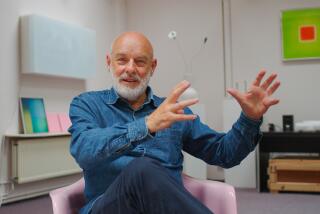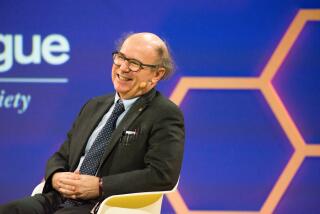The Zen of Quantum Mechanics : SCIENCE, ORDER, AND CREATIVITY A Dramatic New Look at the Creative Roots of Science and Life<i> by David Bohm and F. David Peat (Bantam: $8.95, paper; 280 pp.) </i>
- Share via
“Science, Order, and Creativity” is one of those books that start off making reasonably good sense but then spin off into Never Land. Maestro, strike up the theme from “The Twilight Zone.”
The authors, David Bohm and F. David Peat, are physicists who believe that physics and all of science are too narrowly focused to answer the really important questions that face the world. In the Introduction, they assert, “What is needed is wisdom . It is a lack of wisdom that is causing most of our serious problems rather than a lack of knowledge.”
Few people could disagree with that assessment of the current state of things. What to do about it is another matter.
Many scientists are impatient with questions of philosophy and first principles. They tend to dismiss such speculation as ungrounded nonsense. This book gives evidence of why.
Now, I am not unsympathetic either to questions of first principles or to calls for re-examining long-held assumptions, both of which are recurrent themes in this book. Along with Bohm and Peat, I believe that creativity is better than banality, that excellence is better than mediocrity and that intelligence is better than ignorance.
But doesn’t everybody (or nearly everybody) believe these things? The authors castigate scientists for being too narrow-minded and specialized and for missing the forest for the trees, as it were, but their proposed solutions are all forest and no trees.
But I’m getting ahead of myself. It would be unfair to dismiss this book completely as the mystical rantings of a scientific Shirley MacLaine. Bohm and Peat do have some insights, and subtle insights at that.
“Whatever we say anything is, it isn’t,” they write. “It is also something more and something different.” As William James pointed out nearly a century ago, reality always overflows anything we can say about it.
Further, the authors understand very well that conflicting ideas are not necessarily incompatible and do not have to be reconciled. Rather, they may and frequently do establish a tension that pulls first one way and then the other, each appropriate for certain circumstances and inappropriate for others.
Truth is many-faceted, and, for example, physics is neither completely determined nor completely undetermined. In a sense, this is the picture of reality that is provided by quantum mechanics. The authors write:
“There is no need to fall into the assumption of complete determinism (although this may in certain fairly broad contexts be a correct abstraction and approximation). Nor is there any need to assume that chance and indeterminism rule absolutely (though these too will provide correct abstractions and approximations in their appropriate contexts).”
“No matter which system of law may be appropriate in the context that is currently under investigation,” they continue, “there is always room for something more and something different--something that will be more subtle and that has the ultimate potential for being a manifestation of creativity.”
That last phrase is a warning of what is to follow. For Bohm and Peat wind up embracing Zen Buddhism, and they approvingly cite the work of Jiddu Krishnamurti. “His writings go extensively and deeply into the question of how, through awareness and attention to the overall movement of thought, the mind comes to a state of silence and emptiness, without any sense of division between the observer and the observed,” they say.
“Such a mind is in a suitable state for entering what may be called the ground of all being and that this is the ultimate meaning of existence.”
Obviously there are many people who find this sort of thing meaningful, and I sometimes wish that I were among them. But try as I might, I wind up scratching my head and wondering what it is that they are talking about.
Of course, I think I am right and those of differing opinions are wrong, but I have no way to prove it, just as those with other views have no way to prove them. What I count as evidence others dismiss, and what others call evidence is not persuasive to me. (Aren’t most things that way?)
So, readers receptive to a link between science and Zen Buddhism might find “Science, Order, and Creativity” just the ticket. Others need not tarry here.
More to Read
Sign up for our Book Club newsletter
Get the latest news, events and more from the Los Angeles Times Book Club, and help us get L.A. reading and talking.
You may occasionally receive promotional content from the Los Angeles Times.










